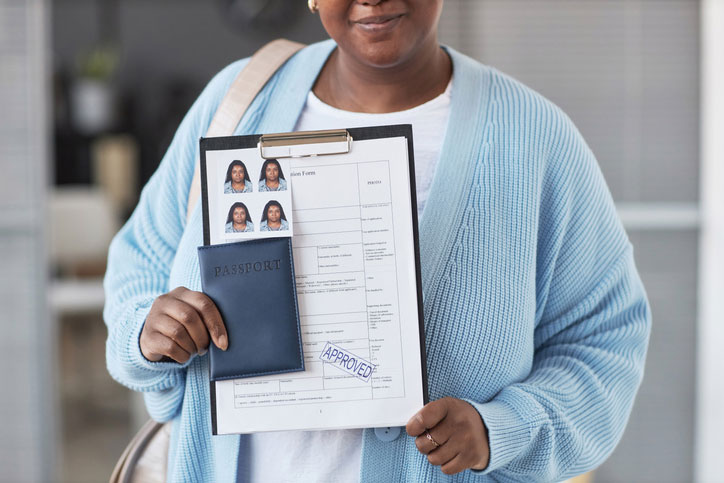Written by Scott Wilson

In a state that only has two kinds of permanent credentials for social workers, you won’t have trouble knowing which path to commit to — clinical or non-clinical social work.
That part is simple. But you still might be surprised at what you learn about the purpose and requirements for state-issued credentials here in Florida.
The titles for the two master’s-level social work credentials available here immediately tell you which one applies to which path:
Each has its own particular qualifications, practice areas, and renewal requirements. Complicating matters is the fact that it’s possible to earn and hold both simultaneously—and there are good reasons why you may want to do so.
What Are the CMSW and LCSW Social Work Licenses in Florida?
In many states, you’ll find LMSW (Licensed Master Social Worker) and LCSW (Licensed Clinical Social Worker) licenses that live at different points on the same spectrum. In many cases, an LMSW is a step below the LCSW or even a required step on the path to becoming an LCSW.
In Florida, however, the CMSW is an altogether different kind of credential than the LCSW.
A Licensed Clinical Social Worker in Florida has full clinical practice authority to perform psychotherapeutic services to diagnose and treat mental health, substance abuse, or other behavioral disorders. They have legal practice authority and obligations along similar lines as licensed mental health counselors or marriage and family therapists, and are regulated by the same Board, the Florida Board of Clinical Social Work, Marriage & Family Therapy and Mental Health Counseling.
A Certified Master Social Worker in Florida does not have any additional practice authority under this credential alone and doesn’t hold a license. Although their credentials are managed and issued by the same Board, the CMSW is actually granted under the authority of the Florida Department of Health, and not the Florida Board of Clinical Social Work, Marriage & Family Therapy and Mental Health Counseling. They have certain legal obligations for reporting, record-keeping, and client confidentiality that are similar to LCSWs, but under the CMSW designation they have no authority, either independently or with supervision, to practice any sort of clinical social work.
The LCSW is mostly aimed at and aligned with micro social work—delivering direct services to patients including diagnoses of complex mental health and behavioral conditions like PTSD, bipolar disorder, and substance use disorder, and subsequent treatment by way of talk therapy.
In a Sense, the LCSW Has More in Common with Other Kinds of Counseling Credentials than it Does with the CMSW
 The fact that it’s call ed the Florida Board of Clinical Social Work, Marriage & Family Therapy, and Mental Health Counseling probably clued you in to the fact that there are more options for counselor licensing than just these two social work credentials.
The fact that it’s call ed the Florida Board of Clinical Social Work, Marriage & Family Therapy, and Mental Health Counseling probably clued you in to the fact that there are more options for counselor licensing than just these two social work credentials.
In fact, the similarity between the kind of psychotherapeutic counseling that LCSWs perform and that offered by Licensed Marriage & Family Therapists (LMFTs) or Licensed Mental Health Counselors (LMHCs) is such that many of the state laws governing counseling don’t distinguish between them.
But there are important differences, and good reasons you might choose social work over other counseling roles.
For starters, there’s nothing else at all like the social work approach when it comes to covering the environmental, systemic, and cultural factors that can impact mental and behavioral health. Both LCSWs and CMSWs have a range of capabilities to address problems that LMFTs and LMHCs can’t even touch, things like homelessness or the cultural bases of gun violence.
With nearly 3,000 people killed and more than 4,200 wounded by guns in Florida every year, not to mention horror shows like Pulse or Parkland, that’s an issue that puts a lot of weight on mental health here. Yet an LMHC can do nothing but console victims after the fact. Becoming a social worker gives you more tools to rip this sort of social ill out at the roots.
The CMSW, on the other hand, is aimed at macro and mezzo level social workers—those who focus on less direct or more systemic kinds of support. It demonstrates advanced qualifications in administrative, policy, and leadership in human services.
An LCSW is free to perform macro and mezzo social work, but CMSWs would need to also obtain an LCSW in order to perform any kind of clinical treatments.
Differences and Similarities in Educational Requirements for LCSW and CMSW Social Workers in Florida

Both types of credential require a Master of Social Work degree and some amount of practical, post-graduate field experience in social work.
Between the LCSW and CMSW, there are differences in requirements for both the course content of the MSW you need to earn and the amount and type of fieldwork you need to complete.
LCSW candidates have to earn an MSW that has a specific amount and type of clinical therapy training. They’ll have to go through a program that includes a minimum of 24 semester hours of courses in theories of human behavior and clinical practice, including psychopathology.
CMSW candidates, on the other hand, must have 3 semester hours in what are sometimes called the generalist skills:
- Program planning and evaluation
- Community organization and services
- Human services advocacy
- Social planning and staff development
- Agency administration and supervision
There is nothing that prevents all of these requirements from being fulfilled by one program. An MSW with a clinical social work specialization can easily have the administrative and macro coursework included through electives.
Comparing CMSW vs LCSW Post-Master’s Field Work Requirements
Both credentials require an extensive amount of field experience before you can even apply—two years for an LCSW and three years for the CMSW.
Both years for the LCSW must be post-MSW supervised experience, with a Qualified Supervisor (QS) overseeing and signing off on your clinical work. In order to legally earn that experience, you also have to take the intermediate step of becoming a Registered Clinical Social Work Intern for that duration.
Anyone applying for an LCSW by endorsement has already met field experience requirements in their own state and may skip the supervised experience step when transferring to Florida.
The CMSW requirements are slightly different. Two of the three years of their experience must also be post-MSW and supervised, but not necessarily by a QS or even another CMSW. Instead, it has to be performed by someone who simply meets the education and experience requirements as a CMSW or as an LCSW.
That really opens up the pool of potential supervisors for CMSWs. And the third year of experience is not required to be supervised at all, and feasibly can be acquired prior to earning an MSW. As a practical matter, all three years are likely to be post-MSW, however.
Comparing the Applications Process for a Licensed Clinical Social Worker Versus a Clinical Master Social Workers in Florida

When it comes time to actually apply for and receive the credentials, it’s the LCSW that ends up with a bit more to do.
Both credentials require passing a standardized national examination from the Association for Social Work Boards (ASWB):
- LCSW - Clinical exam
- CMSW - Advanced Generalist exam
The content of the exams differs but both are 170-question, multiple choice, computer-based but in-person tests.
The CMSW applicant is done at that point, but the LCSW candidate has to go on to complete additional, state-specified trainings in HIV/AIDs, laws and regulations, and domestic violence.
There are similar differences in ongoing continuing education requirements. While both credentials have to be renewed every two years, and require 30 hours of CE to do so, the LCSW has a few more specific types of classes to fit in each time.
LCSW Versus CMSW Jobs in Florida
The most dramatic difference between the LCSW and the CMSW comes down to the jobs you can get with each.
With an LCSW, a social worker can theoretically perform any type of social work role in the state. With clinical practice authority, all the micro counseling jobs are on the table. A good fit for an LCSW might be as a social worker and data coordinator with KIDZ Medical in Miami, conducting psychosocial assessments of patients at Nicklaus Children’s Hospital and developing and carrying out individual support and therapy plans.
Since there are no restrictions on macro or mezzo roles in Florida, LCSWs can also perform in those positions.
Since the CMSW doesn’t come with the authority to offer clinical counseling, candidates holding that credential alone won’t qualify for clinical social work jobs. On the other hand, with more extensive training and experience on the administrative and policy side, they are going to have an edge when it comes to applying for and taking on jobs in coordinating and organizational social work. A great match for this credential might be with the National Youth Advocate Program in Broward and Palm Beach Counties as a Foster Parent Growth and Retention Coordinator, handling PR and meeting with potential foster parents on certification.
How To Compare Roles and Salaries for LCSW vs CMSW Jobs in Florida
With greater administrative and organizational qualifications, as well as more experience, it’s also a natural fit for CMSWs to aim at major advocacy or policy roles. A domestic violence advocate and economy justice coordinator role at Harbor House of Central Florida, for instance, may both identify and advocate for resources for survivors of domestic violence.
Although the Bureau of Labor Statistics tracks multiple types of social work positions throughout Florida for both salary and employment levels, they do not break them down by clinical or non-clinical positions. So it’s impossible to see what the potential differences might be in salary levels for these two credentials.
However, with more advanced training and more in-depth experience in the types of social work that typically leads to leadership positions, you might guess that CMSWs have a higher ceiling when it comes to earning potential. LCSWs, on the other hand, may be more likely to have higher starting salaries with more in-demand direct treatment skills and no competition from unlicensed social workers for those positions.
Both Florida Social Work Credentials May Be the Winning Combination for High-Level Human Services Careers
A keen observer of social work and the needs of human services agencies will note that the combination of both clinical and generalist skills make for excellence in leadership and advocacy at the highest levels. When you’ve spent time on the ground at the Homeless Services Network of Central Florida trying to counsel and rehouse folks in Orange, Osceola, and Seminole counties, you come away with some insights that maybe some of those folks in Tallahassee at the state Legislature could benefit from hearing.
It’s not out of the question that you may choose to become licensed as an LCSW initially, and in later parts of your career choose to become certified as a CMSW as you work your way up to administrative and leadership positions.
The Board rules give you a leg up in these circumstances. The required three years of post-graduate experience needed for the CMSW must include two years of supervised practice. But that can be clinical practice and clinical supervision. There’s nothing that prevents you from counting your time as a Registered Clinical Social Work Intern toward both credentials.
With only one additional year of practice needed to meet the requirements for the CMSW, you don’t have to wait very long before applying.
Of course, you still need to have the appropriate coursework for both credentials. If you failed to get the necessary hours during your MSW, however, it’s still possible to pursue a graduate or post-graduate social work certificate in the areas where you need to catch up.
In either case, Florida offers more options than most states to develop official credentials for every type of social work practice. That makes it a state where people can count on social workers to maintain the highest standards of the profession.
